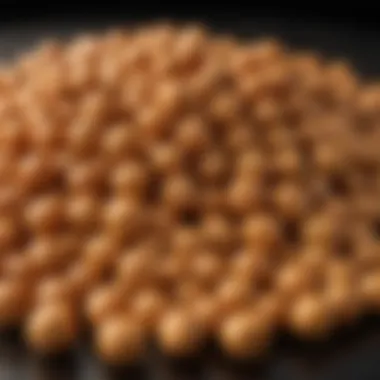Effective Nutrition Tips for Reducing Belly Fat and Achieving Weight Loss Goals


Nutrition Fundamentals
To kickstart our journey toward attaining a trimmer waistline and a healthier lifestyle, it's imperative to delve deep into the core fundamentals of nutrition. Understanding the impact of different food groups, macronutrients, and portion control lays the groundwork for effective belly fat reduction strategies. By elucidating the significance of a well-balanced diet rich in essential nutrients and low in processed sugars and unhealthy fats, we pave the way for sustainable weight management goals.
Key Points Discussed:
- Importance of Nutrient-Rich Foods
- Balancing Macronutrients
- Portion Control Strategies
- Mitigating Processed Sugar and Unhealthy Fats
Meal Planning Strategies
Mastering the art of meal planning serves as a pivotal aspect of combatting belly fat accumulation. By meticulously crafting a weekly meal plan that aligns with our nutritional goals, we can curtail impulsive eating habits and make conscious choices that promote fat loss. Prioritizing whole foods, lean proteins, and fibrous vegetables not only fuels our bodies optimally but also aids in fostering a sustainable relationship with food, steering us closer to our weight loss ambitions.
Primarily Addressed Aspects:
- Benefits of Meal Prepping
- Whole Foods Versus Processed Options
- Protein and Fiber-Rich Choices
- Mindful Eating Practices
Physical Activity Integration
Pairing nutritious eating habits with regular physical activity is touted as a winning combination in the realm of belly fat reduction. Incorporating a tailored exercise routine that encompasses both cardiovascular and strength-training elements can expedite fat-burning processes while sculpting a leaner physique. By elucidating the symbiotic relationship between diet and exercise, individuals can maximize their efforts in achieving a toned abdomen and bolstered overall well-being.
Highlighted Elements:
- Cardiovascular Versus Strength-Training Benefits
- Effective Fat-Burning Exercises
- Crafting a Sustainable Workout Plan
- Importance of Consistency and Progression
Hydration Habits and Their Impact
Amidst our quest to shed stubborn belly fat, the role of hydration often takes the backseat despite its monumental significance towards achieving optimal health. Prioritizing adequate water intake not only aids in digestion and toxin elimination but also plays a crucial role in curbing cravings and promoting satiety. By unraveling the benefits of staying adequately hydrated and the detrimental effects of dehydration on weight loss efforts, individuals can hone in on this foundational component for a thriving metabolism and enhanced fat loss.
Discussed Aspects:
- Importance of Hydration in Weight Management
- Optimal Daily Water Intake Guidelines
- Hydration's Influence on Hunger and Metabolism
- Strategies to Enhance Water Consumption
Quality Sleep Benefits on Fat Loss
In the pursuit of a slimmer waistline, the often-overlooked yet potent weapon of quality sleep emerges as a prominent catalyst for fat loss. Delving into the intricate relationship between sleep patterns, hormonal regulation, and metabolic functions unveils the transformative impacts of sufficient rest on our body composition and weight management endeavors. By shedding light on the vital role of sleep in sculpting a lean physique and thwarting weight gain, individuals can harness this natural resource to potentiate their belly fat reduction journey.
Key Insights Explored:
- Sleep Duration and Hormonal Balance
- Link Between Sleep Quality and Appetite Control
- Strategies for Enhancing Sleep Hygiene
- Sleep's Influence on Weight Loss Success
Stress Management Techniques for Weight Loss
In the midst of navigating the complexities of modern living, stress lurks as a pervasive disruptor of our weight loss pursuits, impacting hormonal balance and dietary choices. Unveiling effective stress management techniques that encompass mindfulness practices, relaxation strategies, and boundary-setting empowers individuals to mitigate stress-induced weight gain and optimize their body's fat-burning potential. By elucidating the interconnected nature of stress and belly fat accumulation, we equip ourselves with indispensable tools for fostering a harmonious mind-body balance conducive to achieving our weight loss aspirations.
Explored Measures:


- Mindfulness Practices for Stress Reduction
- Relaxation Techniques for Cortisol Regulation
- Setting Boundaries to Combat Stress Eating
- Self-Care Rituals for Enhanced Well-Being
Sustainable Behavior Modification
Efforts geared towards molding sustainable behavior changes are instrumental in fortifying our quest for lasting belly fat reduction and holistic well-being. By shedding light on the psychology behind habit formation, self-monitoring strategies, and goal-setting techniques, individuals can navigate the intricacies of behavior modification with precision and efficacy. Through fostering a growth-oriented mindset and cultivating adaptive behaviors, sustainable weight loss endeavors become not only achievable but a long-lasting reality.
Notable Strategies Explored:
- Psychology of Habit Formation
- Self-Monitoring and Accountability Practices
- Goal Setting for Long-Term Success
- Strategies to Overcome Setbacks and Plateaus
Mindful Eating Practices
Embracing the art of mindful eating not only enriches our gastronomic experiences but also holds the key to unraveling the intricate relationship between food choices and belly fat accumulation. By delving into the nuances of mindful eating techniques, such as savoring each bite, tuning into hunger cues, and practicing gratitude for nourishing inputs, individuals can forge a harmonious connection with food that transcends mere sustenance, paving the way for conscious eating habits that champion weight loss goals.
Embellished Practices:
- Slowing Down to savor Each Bite
- Listening to Hunger and Satiety Signals
- Mindful Eating Rituals for Every Meal
- Practicing Gratitude for Food Choices
The Role of Nutritional Support
The incorporation of targeted nutritional support in our belly fat reduction journey amplifies our capacity to leverage the power of vital micronutrients in fine-tuning metabolism and promoting fat loss. By shedding light on key supplements that aid in metabolic regulation, digestive health, and appetite management, individuals can harness these additional tools to augment their dietary efforts and bolster their path towards a leaner physique and optimal well-being.
Explored Supplements:
- Metabolism-Boosting Nutrients
- Digestive Enzymes for Optimal Absorption
- Appetite Suppressants and Satiety Enhancers
- Supplemental Support for Enhanced Weight Loss Efforts
Understanding Belly Fat
Belly fat, scientifically termed visceral fat, is a major concern for many individuals striving for a healthier lifestyle. Understanding the nuances of belly fat is crucial in the journey towards optimal well-being. Visceral fat is a type of fat that surrounds vital organs in the abdominal cavity, posing significant risks to health. It is essential to distinguish between visceral fat and subcutaneous fat. Subcutaneous fat, while not as harmful, still contributes to overall body fat percentage. In this article, we delve into the distinct characteristics of visceral and subcutaneous fat, shedding light on their impact on health.
Types of Belly Fat
Visceral Fat
Visceral fat, contrary to subcutaneous fat, poses a more significant threat to health. Located deep within the abdominal cavity, it can increase the risk of various health conditions such as heart disease and diabetes. Its unique feature lies in its proximity to vital organs, impacting their functionality. Understanding the detrimental effects of visceral fat is pivotal in addressing weight loss goals and overall well-being.
Subcutaneous Fat
On the other hand, subcutaneous fat resides just beneath the skin and is relatively less harmful than visceral fat. While it may not directly affect organ function, excess subcutaneous fat can lead to aesthetic concerns and health risks associated with obesity. Recognizing the differences between visceral and subcutaneous fat is essential for tailoring effective strategies to reduce belly fat.
Health Risks Associated with Excess Belly Fat
Heart Disease
Excess belly fat, particularly visceral fat, is strongly linked to an increased risk of heart disease. The proximity of visceral fat to the heart and blood vessels can disrupt normal cardiovascular function, raising the chances of developing heart-related conditions. Understanding the connection between belly fat and heart disease is crucial for implementing targeted nutritional interventions to reduce fat accumulation and mitigate cardiovascular risks.


Type Diabetes
Another prominent health risk associated with excess belly fat is the development of type 2 diabetes. Visceral fat influences insulin resistance, a key factor in the onset of diabetes. Managing belly fat effectively can improve insulin sensitivity and reduce the likelihood of developing type 2 diabetes. Exploring the intricate relationship between belly fat and type 2 diabetes underscores the importance of adopting a balanced diet and healthy lifestyle habits.
Metabolic Syndrome
Metabolic syndrome encompasses a cluster of conditions, including high blood pressure, elevated blood sugar levels, abnormal cholesterol levels, and excess abdominal fat. Excess belly fat, particularly visceral fat, plays a central role in the development of metabolic syndrome. Addressing the impact of belly fat on metabolic health is essential in preventing the onset of this complex condition. By understanding the nuances of metabolic syndrome, individuals can make informed dietary choices and lifestyle modifications to support overall health and well-being.
Creating a Balanced Diet
When it comes to losing that stubborn belly fat, one of the foundational pillars is creating a balanced diet. This section delves into essential aspects, benefits, and considerations surrounding the concept of a balanced diet. A balanced diet is crucial for individuals aiming to shed excess weight around their midsection as it provides the necessary nutrients while regulating calorie intake effectively. By focusing on a balanced diet, individuals can improve their overall health, enhance metabolism, and support sustainable weight loss strategies.
Importance of a Healthy Diet
Nutrient-Dense Foods
Nutrient-dense foods are a vital component of a healthy diet and play a significant role in achieving weight loss goals. These foods are rich in essential vitamins, minerals, and antioxidants while being relatively low in calories. Incorporating nutrient-dense foods like leafy greens, berries, nuts, and lean proteins not only aids in weight management but also boosts energy levels and supports overall well-being. Their high nutritional content ensures that individuals feel satiated and receive the necessary nourishment, making them a popular choice for those focusing on losing belly fat.
Portion Control
Effective portion control is another key aspect of maintaining a healthy diet, especially when targeting belly fat reduction. Controlling portion sizes helps individuals manage their caloric intake, preventing overeating and promoting weight loss. By monitoring portion sizes and consuming meals in moderation, individuals can create a calorie deficit necessary for fat loss. Portion control also cultivates mindful eating habits, encouraging individuals to savor each bite and recognize fullness cues, ultimately aiding in long-term weight management.
Macronutrient Distribution
Proteins
Proteins play a crucial role in a balanced diet aimed at reducing belly fat. As the building blocks of muscles, proteins facilitate muscle growth and repair, supporting metabolism and enhancing fat-burning processes. Choosing lean protein sources such as chicken, tofu, and legumes not only promotes satiety but also helps preserve lean muscle mass during weight loss. Integrating proteins into meals balances blood sugar levels, regulates appetite, and boosts metabolic rate, making them a valuable asset in a weight loss journey.
Carbohydrates
Carbohydrates are often misunderstood in the context of weight loss, but they are essential for providing energy and supporting bodily functions. Opting for complex carbohydrates like whole grains, fruits, and vegetables offers sustained energy levels, curbs cravings, and aids in digestion. By including carbohydrates in a balanced diet, individuals can prevent nutrient deficiencies, enhance workout performance, and maintain a healthy metabolism crucial for burning belly fat effectively.
Healthy Fats
Contrary to popular belief, healthy fats are beneficial for losing belly fat when consumed in moderation. Fats like those found in avocados, nuts, and olive oil are rich in monounsaturated and polyunsaturated fats, which support heart health and reduce inflammation. Including healthy fats in a balanced diet promotes feelings of fullness, improves nutrient absorption, and regulates hormones essential for weight management. By emphasizing the intake of healthy fats, individuals can achieve a well-rounded diet that aids in belly fat reduction.
Effective Nutrition Strategies
In this section, we delve into the significance of Effective Nutrition Strategies concerning the imperative goal of losing excess belly fat. By emphasizing the pivotal role of nutrition in weight management, individuals can make informed choices to promote sustainable results. Effective Nutrition Strategies encompass a spectrum of dietary approaches tailored to optimize health and wellness. Understanding the impact of food choices on metabolism and energy balance is fundamental in achieving desired weight loss outcomes. Adopting a nutritionally balanced diet rich in essential nutrients can aid in reducing abdominal fat accumulation and improving overall body composition.
Meal Planning Tips
Balanced Meals
Discussing the cardinal aspect of Balanced Meals enunciates the essence of harmoniously combining proteins, carbohydrates, and healthy fats in appropriate proportions. Balanced Meals are instrumental in fostering satiety, regulating blood sugar levels, and supporting metabolic function. The hallmark of Balanced Meals lies in their ability to supply necessary nutrients essential for sustenance and vitality. This dietary approach emphasizes the consumption of whole, unprocessed foods to enhance nutritional quality and promote weight management. The versatility of Balanced Meals allows individuals to customize their intake based on personal preferences and dietary requirements, making it a versatile and sustainable choice for attaining weight loss goals.


Fiber-Rich Foods
Delving into the realm of Fiber-Rich Foods illuminates their crucial role in optimizing digestive health and promoting weight loss. Fiber-Rich Foods are characterized by their high content of dietary fiber, which confers numerous health benefits, including improved satiety, enhanced gut motility, and regulated blood cholesterol levels. The salient feature of Fiber-Rich Foods lies in their ability to support a healthy gut microbiota and aid in weight management. Integrating a variety of fiber sources such as fruits, vegetables, legumes, and whole grains into the diet can bolster long-term weight loss efforts and improve overall metabolic health. While Fiber-Rich Foods offer substantial advantages in promoting satiety and aiding digestion, excessive consumption may lead to gastrointestinal discomfort in some individuals.
Hydration and Its Role
Water Intake Recommendations
Exploring the importance of Water Intake Recommendations underscores the essential role of adequate hydration in supporting metabolic function and promoting overall health. Optimal water consumption is vital for cellular hydration, nutrient transport, and toxin elimination. Water Intake Recommendations advocate for regular intake throughout the day to maintain hydration status and support metabolic processes. The key characteristic of Water Intake Recommendations lies in their ability to optimize physical performance, facilitate weight loss, and enhance cognitive function. By adhering to recommended daily water intake guidelines, individuals can mitigate dehydration risks and support efficient nutrient absorption. While adequate hydration offers manifold advantages, excessive water consumption beyond physiological needs may lead to electrolyte imbalances and uncompromising health.
Herbal Teas
Delving into the realm of Herbal Teas accentuates their therapeutic properties and potential benefits in relation to weight management. Herbal Teas are renowned for their medicinal qualities, ranging from digestive support and stress reduction to metabolic enhancement and appetite suppression. The key characteristic of Herbal Teas lies in their diverse array of botanical ingredients with unique health-promoting properties. Consumption of Herbal Teas can provide a hydrating and flavorful alternative to plain water while offering potential metabolic benefits. Incorporating Herbal Teas into daily hydration routines can elevate antioxidant intake, support digestion, and aid in weight loss efforts. However, it is essential to exercise caution with certain herbal blends and consult with a healthcare provider to ensure compatibility with individual health needs and goals.
Supplements and Belly Fat Loss
Key Supplements to Consider
-#### Omega-3 Fatty Acids
Omega-3 fatty acids are essential nutrients known for their anti-inflammatory properties and numerous health benefits. In the context of belly fat loss, Omega-3 fatty acids can help reduce inflammation, improve insulin sensitivity, and support overall metabolic function, facilitating the breakdown of fat stores. Their unique characteristic lies in their ability to promote a healthy balance of essential fats, crucial for cellular function and energy production. Choosing Omega-3 fatty acids as a supplement in this article is based on their well-established reputation for supporting heart health and aiding in weight management. While Omega-3 fatty acids offer numerous advantages like reducing systemic inflammation and promoting cardiovascular well-being, some individuals may experience mild drawbacks such as gastrointestinal discomfort when consuming high doses.
-#### Probiotics
Probiotics are beneficial bacteria that support gut health and digestive function, playing a vital role in metabolism and weight regulation. When it comes to targeting belly fat, probiotics can help maintain a healthy gut microbiome, improve nutrient absorption, and reduce bloating. Their key characteristic lies in restoring the balance of good bacteria in the gut, which is essential for optimal digestion and nutrient utilization. Including probiotics as a supplement in this article is justified by their popularity in promoting digestive wellness and potentially aiding in weight loss. The unique feature of probiotics is their ability to modulate gut flora, contributing to better digestion and immune function. While probiotics offer advantages like enhancing gut health and boosting immunity, some users may experience minor disadvantages such as mild gastrointestinal issues during the adjustment period.
Consulting a Healthcare Professional
In the arena of belly fat loss and nutrition tips, seeking medical advice is paramount for safety and effectiveness. The importance of consulting a healthcare professional stems from the need for personalized guidance and supervision, especially when considering supplements for weight management. Medical advice provides invaluable insights into individual health status, potential contraindications, and personalized recommendations, ensuring that any dietary or supplement interventions are aligned with specific needs. Opting for medical advice in this article is a prudent choice due to its role in enhancing the overall safety and efficacy of weight loss efforts. The unique aspect of medical advice lies in its tailored approach, addressing individual health concerns and optimizing treatment strategies accordingly. While medical advice offers advantages such as personalized recommendations and professional oversight, potential drawbacks may include the need for regular monitoring and possible adjustments based on medical feedback.
Lifestyle Modifications
When it comes to losing belly fat, lifestyle modifications play a pivotal role in achieving successful results. Incorporating changes in daily routines, especially regarding physical activity and stress management, can significantly impact weight loss efforts. Embracing a combination of healthier habits can lead to long-term benefits for individuals looking to trim their waistlines.
Physical Activity
Cardiovascular Exercises
Cardiovascular exercises, commonly known as cardio, are essential for burning calories and promoting overall health. These exercises elevate heart rate, increasing calorie expenditure during and after the workout. Activities like running, cycling, or swimming engage major muscle groups, enhancing endurance and cardiovascular efficiency. Incorporating cardio into a fitness routine not only aids in weight loss but also boosts heart health, endurance levels, and energy.
Strength Training
Strength training involves resistance exercises targeting muscle groups to build strength and tone. Unlike cardio, strength training focuses on enhancing muscle mass, leading to a higher resting metabolic rate. By increasing muscle mass, individuals can burn more calories even at rest, contributing to fat loss and toning the body. Additionally, strength training helps prevent muscle loss during weight loss phases and improves overall functional strength and mobility.
Stress Management
Mindfulness Practices
Mindfulness practices encompass techniques like meditation and deep breathing to cultivate present-moment awareness and reduce stress levels. By honing mindfulness, individuals can better manage emotional eating triggers, resulting in improved dietary choices and portion control. Regular mindfulness sessions offer mental clarity, emotional stability, and a sustainable approach to combat stress-related weight gain.
Adequate Sleep
Quality sleep is crucial for weight management as it influences hunger hormones and metabolism regulation. Consistent adequate sleep duration supports metabolic functions, appetite control, and energy balance. Lack of sleep disrupts hormonal balance, leading to increased cravings, poor appetite regulation, and potential weight gain. Prioritizing quality rest is essential for enhancing overall well-being and optimizing weight loss efforts.



